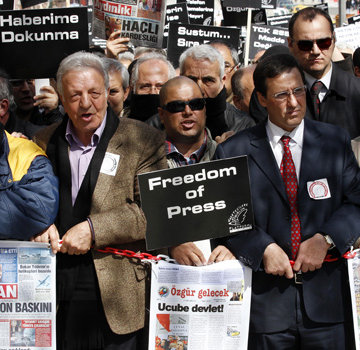- About
- Topics
- Picks
- Audio
- Story
- In-Depth
- Opinion
- News
- Donate
- Signup for our newsletterOur Editors' Best Picks.Send
Read, Debate: Engage.
| editor: | Gurmeet Singh |
|---|
Turkish satirical journalists and cartoonists have been threatened to “learn” from the attack on Charlie Hebdo last week. Threats have come via anonymous phone calls as well as very direct messages on social media, with journalists being warned off engaging in satirical criticisms of Islam, but more intriguingly, criticism of the nation’s incumbent leader, Erdogan.
Al-monitor.com has provided a brief summary of Turkish responses to the events in France, ranging from disgust to outright endorsement. Tuncay Akgun, executive editor of satirical cartoon magazine Lemen, shared photos of the deceased Charlie Hebdo artists over social media, with the heartfelt caption: “they were our friends”. Others were not so pensive. Kerem Cenk tweeted with great vitriol: “the number of heads to be taken out in Leman magazine is more than 12”.
This divide in views may not necessarily be surprising, but it is dangerous. In a country where there is little-to-no legal protection for journalists and those wishing to speak against the government, there is reason to take such threats seriously; press freedom is being threatened, provoked and curtailed across the world, and in a context such as Turkey’s, there is little to prevent it being snuffed out entirely.
Furthermore, the article highlights just how different Turkish commentators are conflating the events in Paris with local politics; threats are being made against journalists not for criticising religions or terrorism, but for criticising Erdogan.
It is worrying to see how the events in Paris are being appropriated by people wishing to manipulate domestic politics, but it also truly shows the complexity of the problem at hand. It’s not just press freedom at stake – it’s press freedom in different contexts, which includes different contexts of violence and different contexts of political engagement.
Image: Journalists and activists participate in a rally calling for press freedom in central Ankara on March 19, 2011. (Umit Bektas/Reuters)
